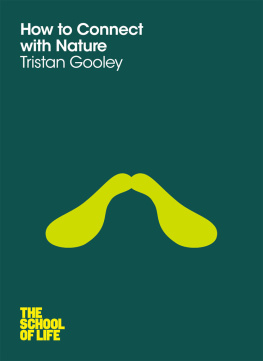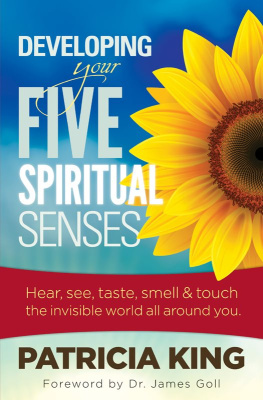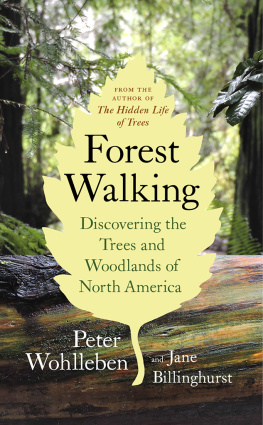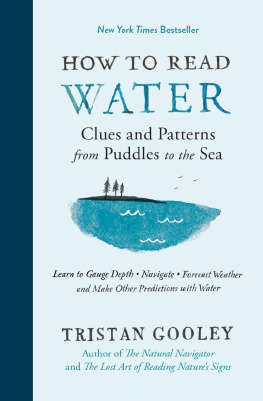CONTENTS
I
INTRODUCTION
THERE ARE MANY PEOPLE WHO WILL cajole you to take an interest in nature because they see this as a necessary part of a broader environmental goal. I am not one of them, and this book is not part of that benevolent drumbeat. Of course, everybody wants to live in a sustainable environment, in the same way that nobody of right mind wants war. Some people are more passionate about it than others, but no sane person likes to see the planet irrevocably harmed.
In this book I am imploring you to read naturethat is, to look more closely at nature to discover the clues and signs in the outdoors that are all around us, if we take the time to notice themfor a different reason. This reason is that it is the best possible deal out there. Reading nature will give you a much more interesting experience every minute you spend outdoors. That is one side of the deal. The other side is that reading nature cultivates a deeper connection with your surroundings, one that will make you a more interesting and effective person. I know that is a boldif not arrogantstatement, but I do mean it. Have you ever found yourself talking to somebody who is so engrossed in the practical details of life that you find it hard to connect with them? Perhaps the person who talks about their plans for developing their property relentlessly? Or the one who knows the cost of everything and the value of nothing?
Have you ever lost interest in somebody because they are so enthralled by their own philosophical view of an issue that they cannot see the real world around them? Im thinking of the person who corners you to discuss problems in the developing world, oblivious to the fact there is a young child playing with a sharp knife next to them.
The joy of reading the signs in nature, and how one observation often reveals a clue or hint about some other aspect of the outdoors, is that it allows each of us to see each living thing, object, and idea within its own intricate network. It allows us to view things in the most practical and philosophical way simultaneously. There is no other field that I am aware of that does this. We can look at a plant as a source of food and as a key to appreciating a moment in timeat the same time.
THE DESIRE TO read nature is not commonplace. Most people remain oblivious to the sounds of the birds all around them. They can ignore the most exquisite form of a wildflower and fail to find any beauty in the insect by their feet. Surely, we might hear them say, only those geologists who have opted out of society can find a rock interesting. This is the ordinary view. It is a view held by a lot of people who would be happy to have more interesting lives.
Since you are reading this book, you take the extraordinary view. You either suspect or already know that reading nature more carefully and thus forming a deeper bond with the outdoors has the potential to be an exciting and meaningful experience. Perhaps you have a desire to rediscover a lost connection: If we go back far enough we all find there was once a bond. It is found for many in memories of childhood, but we can be certain of finding it by going back further still, to our ancestors.
Later in the book I will argue that the stimulation a very deep reading of nature can bring to each person is life-enhancing to the point that it changes who we are. However, there are a few steps to take before that small leap; in
II
THE GROUND AHEAD
1
Getting Ready
The obvious is usually profoundly significant.
EDWARD O. WILSON
WHAT DOES IT MEAN TO READ nature?
It means gaining an insight into the most important network there ever has been and ever will be. It means becoming aware of our relationship with this network. It means expecting a fascinating and enriching experience each time we step outside. And it means embarking on a journey that leads toward the realization that every single thing that we have found interesting up to this point in our lives has its roots in this network we call nature. Health, business, politics, sports, sex, violence, and culture: All subsets of nature.
Reading nature allows us to see the roots that sustain and explain everything around us. The interest we find in a place is intimately tied to the history of that place and how far back we look. Many people focus on what has occurred during the past week, or two hundred years, but we can look back millions of years if we choose to. Politicians may like to warm themselves by focusing on the belief that they are arguing in the Houses of Parliament because they are very important representatives of the people. They only see the last pages of the book; if they flicked back to earlier chapters they would see that they are just Homo sapiens, a species that needs a lot of water to thrive and migrates toward rivers to form colonies in places like Westminster, which is right along the Thames. Big Ben might be thought of as the plumage of that one peculiar species.
IN 1943, THE American psychologist Abraham Maslow proposed a theory based around a human hierarchy of needs. He suggested that healthy development follows a sequence that progresses from the most basic needs, like food and shelter, toward more complex emotional ones, like respect and self-esteem. It is an idea that is mirrored in the steps necessary to more deeply read nature.
Our ancestors must have subconsciously appreciated that a discussion about self-esteem was a low priority if they were starving and suffering from frostbite. Busy, sophisticated modern humans allow themselves to believe that these earlier, lower stages in the hierarchy are in the past, of little relevance to our lives today. But this is a mistake: If we are looking to make a profound connection with our environment we cannot start at the top. Some of the first areas to explore are the practical ways that we can reconnect with nature.
FOR THE MAJORITY of us it is possible to experience a deep sense of joy in doing something new. This desire for novelty may no longer be vital in terms of survival, but it is essential if we want to think differently. This is because there are some basic actions that can bypass our modern and artificial obstacles to thinking. It does not take a huge change in lifestyle to achieve this joy; small actions introduced to a modern routine can have the desired effect. The simple act of using the sun or moon to prevent yourself from becoming disoriented as you drive to a new friends home, for instance, is a more important experience than many might have guessed.
Sheltering from the wind in a hollow, eating wild berries, or curing an ailment with a leaf are no longer necessary physically; we can buy products to overcome these challenges instead. But to achieve a deeper reading of nature they are wonderful early steps. Ludicrously simple acts with obvious consequences can offer surprising philosophical rewards. Walking toward the sound of water gurgling in a stream when thirsty, instead of thinking about a tap or bottle, can open up new thought patterns. A basic new action can blow away some of the sophistries that get in the way of profound insight. This is an idea that has been central for Buddhists for centuries, not least the Zen and Shugendo movements, but that remains important to all of us, regardless of our personal religion or philosophy. That is the whole point of doing it.
NEW ACTIONS INEVITABLY lead to new experiences, and this novelty kicks our senses out of the slump induced by routine. This in turn raises our levels of awareness. One of the peculiar consequences of starting to notice new things is that we cannot help but notice how little we have been noticing hitherto.





